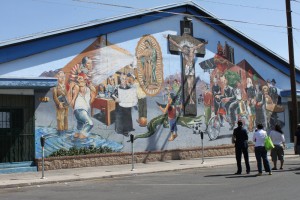Segundo Barrio: a ‘living history’ lesson
|
EL PASO — In the heart of El Paso is Segundo Barrio, a port of entry to the United States. It’s the first community people see when they cross the border from Juarez, Mexico. Located on the city’s south side, Segundo Barrio is home to more than 8,000 people, of whom 50.8 percent are U.S. citizens, 13.7 percent are naturalized citizens and 35.5 percent are non-citizens, according to City of El Paso statistics. Yolanda Chávez Leyva, chair of the University of Texas at El Paso history department, calls Segundo Barrio the “heart of the Mexican diaspora.”
“El Segundo Barrio is one of the most historic barrios in the United States,” Chávez Leyva said. “[It] grew out of the migration of mexicanos to the United States going back to the 1880s and it’s been the starting point for thousands of families across the United States.”
The neighborhood is “very important” to El Paso, she said, because it is where the urbanization of the city began.
